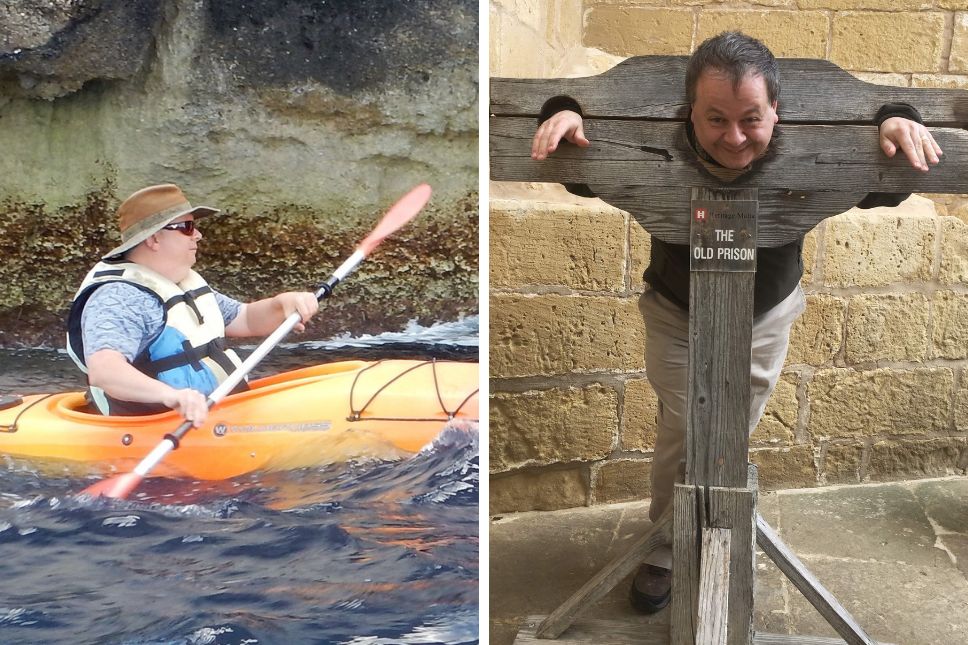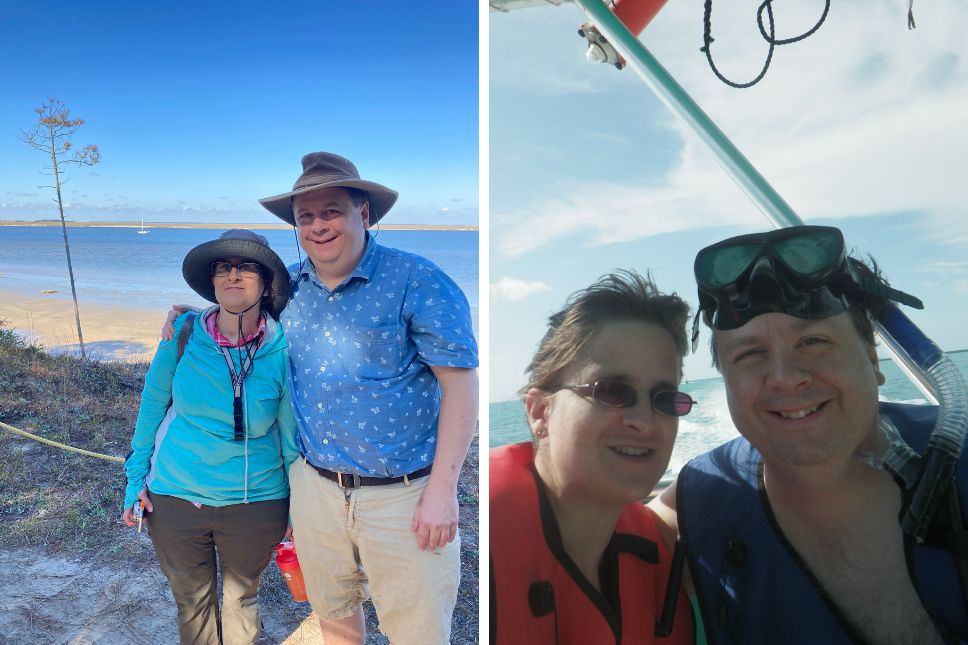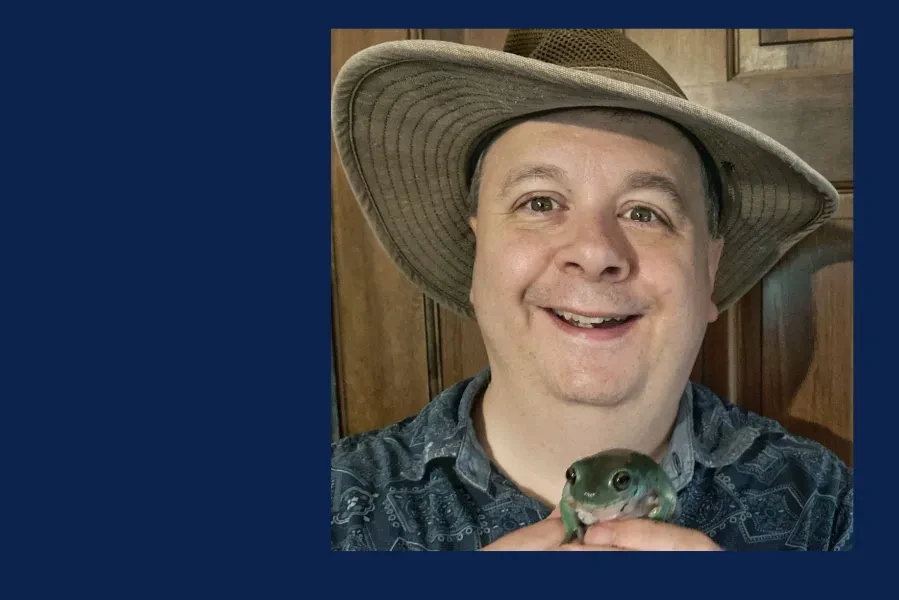If you search for University of Arizona Global Campus (UAGC) Assistant Professor Dr. Clifford Blizard online, the first image you might see is from his faculty profile – with a big smile and a friendly frog.
Dr. Blizard didn’t choose the picture because it was his favorite shot from a recent vacation. He genuinely loves frogs, ever since his first encounter with an amphibian growing up in Pennsylvania.
“My earliest frog story was as a child, in the woods behind my house I had about 30 acres of woodland, wetland, and forest,” he recalls. “I remember going out and seeing a big, big frog, and what does a little boy do with a big frog?
“I poked it with a stick! It jumped a little, so I poked it again, and it jumped a little bit more, and I poked it a third time. It turned and looked at me, and I ran!”
Dr. Blizard’s fascination with frogs formed the foundation for his love of science and sparked a journey of lifelong learning. Years after earning his bachelor’s degree in geology, he returned to school to complete his master’s degree in education with a focus on instructional design and technology (an achievement that would bolster his teaching credentials), and later would go on to earn a master’s degree in geology and a Ph.D. in environmental science.

Left, Dr. Clifford Blizard kayaks off the island of Malta in the Mediterranean; Right, Dr. Blizard poses in a pillory at an historic Malta prison.
Like many UAGC students, Dr. Blizard completed the bulk of his education – his master’s degrees and Ph.D. – while working full time. His career has taken him through multiple teaching roles at SUNY College of Environmental Science and Forestry (as a visiting instructor of environmental geology); Hill Country Montessori School in Palmetto, Georgia; University of Phoenix (as Doctoral Committee Chair in the School for Advanced Studies); Kaplan University (as an adjunct instruction of environmental science); and others. Now at UAGC, he serves as lead science faculty for SCI 207: Our Dependence Upon the Environment, a course in which he challenges students to become more aware (and become better stewards) of the world around them.
“It’s been incredibly rewarding, as it’s opened up exactly the kinds of opportunities that I, as a self-professed generalist with an environmental concern, really connect with,” he explains. “So, it’s been a really rich journey here, and I enjoy it.”
That journey has taken Dr. Blizard and his wife across the country, from Arizona to the Atlanta suburbs, where he serves on the parks commission for his community. It’s the kind of volunteer work that he’s proud to do because it keeps him connected to nature and, especially, frogs. Today, there are several species of amphibians and reptiles living with the couple, including turtles, lizards, and frogs. They’re not all “intellectual superstars,” he admits, but they’re “quite charming.”

Left, Dr. Clifford Blizard enjoys the view on Cumberland Island with his wife Valerie; Right, the couple snorkels in the Florida Keys.
Getting To Know Dr. Blizard
We recently spoke with Dr. Blizard about his career and work in environmental science and beyond. Read on to learn more about this passionate UAGC faculty member.
UAGC: What was your first exposure to teaching as an adult?
Dr. Blizard: “When I was in grad school, this time at Cornell University with a NASA space grant fellowship, I was looking at using remote sensing to study climate change. I ended up minoring in education while I was there, and I had to go to a local Montessori school to do a project. I fell in love with the environment and the whole spirit of the place, and I actually walked away from a fully funded doctoral program to become a Montessori teacher. I started working with young children just for a few months as an assistant. I literally went from sitting in front of a computer processing remote sensing data all day to working with 3-6 year olds – talk about a world shift. Then, I became a certified elementary school teacher and taught first and third grades. I then transitioned into the middle school program. I did that for several years before I decided my degree was unfinished, and I needed to get my doctorate.”
UAGC: How does SCI207 make students passionate about science?
Dr. Blizard: “The students spend all five weeks of the course calculating their ecological water and carbon footprints. They make five changes to them, and they document those changes in a journal. Then, they come back after five weeks and report to the whole class what happened. What are their numbers? Have they changed anything? What’s the outcome? The students almost universally report in the last journal entry how valuable this was to them and how it changed their perception and relationship to the environment. It empowers them to be actors, to make a difference, to benefit a world that is going through some very difficult challenges right now, climate change – or as I call it, climate destabilization – being at the top of the list. So, I feel like that work is really addressing some major issues. I also think there is great joy that comes from seeing students having, as it were, a fire lit under them and getting them to engage.”
UAGC: What drives your passion for teaching?
Dr. Blizard: “My interest is hands-on learning. My interest is deep engagement, transformational learning. It’s about supporting others in learning for themselves, and I try to bring that spirit, that outlook to SCI: 207. Now, I’m also the point of contact for the UAGC Honors Program, so I manage the day-to-day operations of the program and teach a lot of honors courses. They’re highly interdisciplinary and it’s exciting and wonderful to be involved in these courses. I love it. Why? I think partly because I really feel the work I’m doing here is meaningful.”
UAGC: How do you see your role in the world of science? How are you creating change?
Dr. Blizard: “I don’t really think of myself as an agent of change, per se. I think of myself as just facilitating, supporting, providing the environment where these kinds of impactful things can happen. But I get excited when I see students that are deeply excited and passionate. It’s important to educate students for their future careers, absolutely, but when wonder and amazement kick in, and when the sense that ‘I’m going to do this, not just for me and for my family, but I want to make a difference in the community and the world’ kicks in, that’s just awesome. I mean, what could be better than that?”
UAGC: You’re very active in the science community. Can you talk about your work drawing attention to others in your field?
Dr. Blizard: “I’ve always been interested in nature writing. I stumbled upon a book anthology published in the early 1900s with a couple of people I had never heard of, and I thought, ‘What are their stories?’ And that just really ballooned, particularly during COVID. I’ll read these obscure nature writers, and I started tracking down original first editions as much as I could of writers that nobody’s heard about. I ended up tracking down maybe 80 different writers, some of whom don’t have Wikipedia entries. Some of them are amazing writers with some wonderful things to share, and I’ve started a blog of them at http://www.commonplacenature.org.
UAGC: You’re also doing a lot to preserve the amphibian population where you live. Can you discuss that work?
Dr. Blizard: “We have, right here in Atlanta, The Amphibian Foundation, which is focused on the conservation of amphibians. I helped them when the organization was running on an absolute shoestring. The founders decided they were going to offer its first-ever learning course online, and this was about 6-9 months before COVID. I provided a lot of guidance and helped facilitate the first few courses and got them up to speed. they’ve been able to get a lot of resources they need by offering online courses, and they’ve been able to reach an audience beyond the southeast U.S. There are people that take the courses from other parts of the world, and it’s really exciting.”
UAGC: You’ve done a lot of traveling, too. What is your favorite place to visit and why?
Dr. Blizard: “Tasmania is certainly on the list. Tasmania is gorgeous, it’s stunning and that was definitely my favorite part of Australia. A lot of New Zealand is really, really beautiful. I love Ireland, too. I’ve been there a couple of times now and it’s fantastic. I’ve been to both coasts of Canada and I’d love to go up to Alaska. It’s one of two states I haven’t visited yet. But, of all of them, I think about where it would be idyllic to live and that would be Tasmania.”
